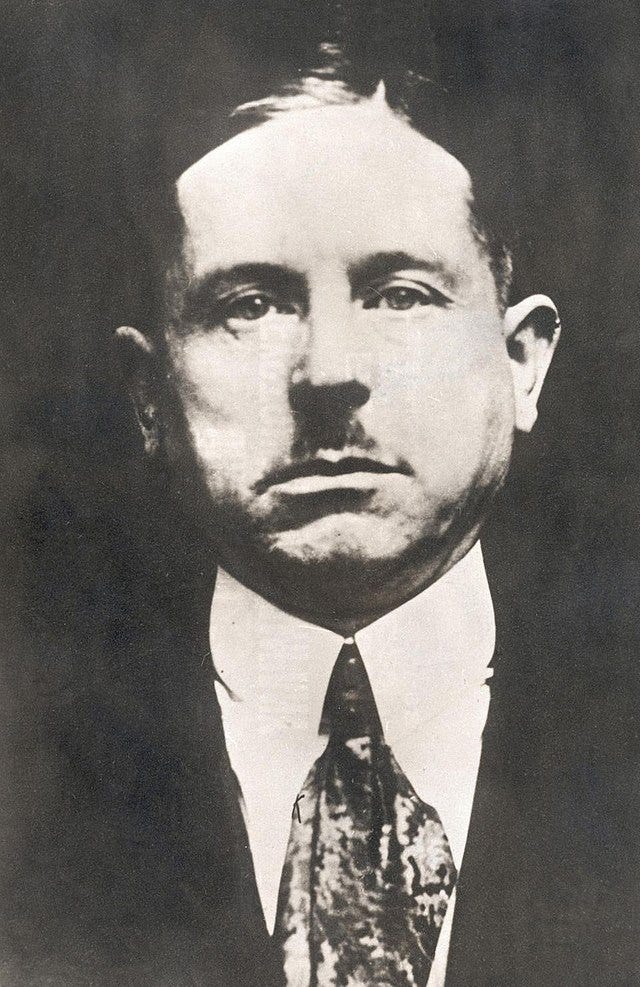This week’s newsletter features the serial killer Peter Kürten, sometimes known as the Düsseldorf Vampire. Please don’t read about him at lunchtime. You may struggle to digest your food when you learn about Kürten’s crimes and how the police struggled to catch him.
Peter Kürten would be caught much more quickly these days. He fits the serial-killer template so well, his biography might almost have been written by a Hollywood scriptwriter. If you’ve ever read a serial-killer biography, or watched a Netflix special about them, you know far more about serial killers than any police officer in the world knew back in the 1930s. We have simply had far, far more experience of them (the phrase ‘serial killer’ barely appeared in English before the 1980s). Some experts have devoted their lives to learning about these criminals, with a view to stopping them.
It’s a sought-after job, in fact. Ask any Psychology lecturer and they’ll tell you - one in three students has their sights set on it. To other people, that might be as inexplicable as wanting to become a mortician or a liquorice-tester. Yet there remains something magnetic about the job. It’s not easy to identify exactly what it is, but I have a few suggestions:

1. Sorcery. The profession has a certain superficial glamour, especially given the way it is presented in films and TV shows. A series of uniquely grotesque crimes occurs. Local police are baffled. The profiler flies in – stained, rumpled, bleary of eye and stubbly of chin, but possessed of magical knowledge. ‘Ah ain’t trust you doggone FBI fellahs,’ the rural sheriff mumbles, whereupon the profiler goes ‘Hocus Pocus’ and (here, the poor sheriff is baffled a second time) fixes everything.
2. Staunchness. That brings me to the second suggestion. Profilers, in a sense, have a conservative role in a society beset by anarchistic criminals. They are orderly, controlled, conscientious, reliable: guardians of The Way Things Ought to Be. They identify the flaws in the system and rectify them. Like the children in the fairy stories who fight the monsters, they save us from our fears.
3. Redemption. It’s a very seductive thought, that one might get a job as a saviour. The vanquished, the downtrodden, the unfortunate – all will benefit if only the profiler gets it right. Of course, it is always too late for some of the victims, but perhaps one might at least keep their numbers low. In serial-killer shows, the profiler often gets there just in time to rescue the most recent damsel in distress. It’s a cliché, for sure, but clichés become clichés for a reason: they speak to some urge or desire deep inside.
4. Forbidden knowledge. This is my most controversial suggestion: serial killers are kinda interesting. Or, if not interesting, fascinating in the way that a squashed bug is fascinating to young children. They allow you to open the lid and squinch at the workings. Psychologists know that visual illusions reveal the correct workings of the eye by showing us what happens when it makes mistakes. In the same way, profilers know that the correct workings of the human mind are revealed when things turn murderous. The child stares at the bug for the same reason that reader of serial killer books stares at the page. Something is to be learnt there: something they don’t teach you in school.
Perhaps all of this is part of what makes Peter Kürten such an interesting case study. At least, I think he is. You may agree. Be sure to come back on Wednesday and find out!
What about this week’s bullet list? I’m glad you asked. I’ve provided links to five immortal Crime & Psychology newsletters about serial crime and offender profiling. Will it be enough to keep you going till Wednesday? Only you can say:
· Here we have the truly bizarre tale of the Hillside Strangler. Or Stranglers. How many were there? You decide.
· This newsletter is about the execution of the serial killer, Edward Castro.
· This post about ‘Crime’s Hierarchy of Needs’ features the Green River Killer, Zodiac, and the murder of the Black Dahlia.
· This post is about Lucy Letby and the bureaucratic system that allowed her (apparent) crimes to continue so long.
· Finally, by following this link you can read about the Calder Oil Field killings, the Texas Killing Fields, and the role that offender profiling played in the tragic case of Robert Abel.





Peter Kürten is a very interesting case. The crimes he was sentenced for were quite different from each other (MO, victim selection, motive). A famous investigator from Berlin named Ernst Gennat wrote an interesting article about Kürten's crimes before they were solved, trying to discuss arguments pro and contra the linkage between the cases: Gennat, E. (1929) Die Düsseldorfer Sexualverbrechen. In this article, Gennat coined the term serial killer ('Serienmörder') and discussed the difficulties of MO based crime linkage.
Certain myths have probably glamorised the job as well, helped by films and books (Mindhunter, Hannibal Lecter, Cracker). I think that in the UK, at least, police profiling is currently staying very lowkey as it tries to reorientate itself as a science- and data-focused aid to investigators.